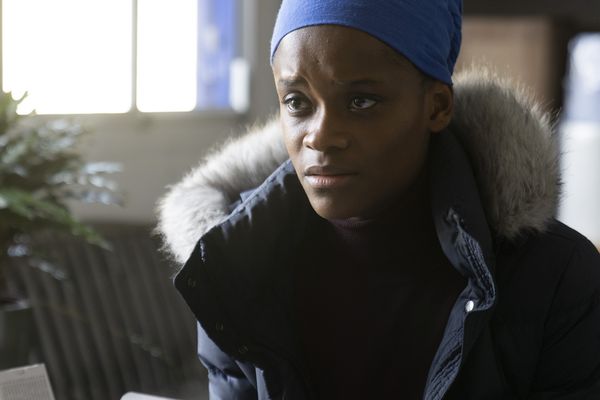 |
| Letitia Wright in Aisha |
Cinema is full of big, dramatic stories, but sometimes it’s the day to day struggles that really leave their mark. Widely praised as it travelled the festival circuit, Frank Berry’s Aisha, which opens in the US this week, tells the story of one Nigerian migrant dealing with the Irish immigration system. Afraid that she will be killed or enslaved if she returns home, she is stuck in the limbo of the asylum process, and a growing friendship with a security guard is bittersweet as she feels she has no control over her life.
It’s a film which stands out partly because of the delicate central performance by Letitia Wright, who is best known for her work in the Black Panther films. She’s a big star but, she assures me, she didn’t let that go to her head when seeking a role in this small Irish film.
 |
| Letitia Wright in Aisha |
“I was lucky to read the script,” she says. “I got to speak to Frank, letting him know how much I resonated with it, how much I loved it. Basically saying ‘I would love the chance to do this.’ I think I even asked to audition. I wasn't even being cocky, like, ‘Hey, you should offer it to me.’ It was like, I'll even audition because I really love the script. But he obviously offered it to me, which was great.
“The process of learning about what was happening in the immigration system and finding different real life stories and piecing them together to form Aisha's background story and what's motivating her and what her purpose is and what she's after – all of that played a big role in it. So I learned so much to build my character. And for me, with a story like this, I know the journey is building a character, but really and truly, it's representing so many women that's gone through this, so many people that's gone through this. So it's just being a vessel for that, really, through a character called Aisha. When you look at her story, it’s so many people's stories all combined.”
Was she surprised by the things that she learned when doing that research?
“Yes and no. I wasn't surprised, and I was surprised. I see a lot on the news, but I feel like I just didn't know how much it was affecting people in Ireland. I know about it in terms of England and where I live, and I know that's tough, but in Ireland, it’s a different type of setup. Learning about that was informative but heartbreaking at the same time.”
We talk about the way that the film conveys the pressure of the multiple small difficulties of life within the system – things like having to go and get documentation just to see the mail, not being allowed to use a microwave or being told to stay out of sight in a hotel which also houses paying guests.
“I feel like I just wanted to find the truth,”” she says. “That’s the same for everything I do. So when I heard stories of people going through the immigration system, every day felt very challenging in the little things. Like a mother talking about trying to cook food for her child and just wanting access to the kitchen. It sounds not like a big deal, right? But it's a form of making that family feel like they have some form of a home, and a mum being able to show her kid ‘I can still provide for you,’ in some way. When you think about it in that way, you can see why it can be hurtful to not have access to the little things, you know?
 |
| Josh O'Connor in Aisha |
“I feel like when I listen to everybody's stories, the big parts of it, like, how you even got here in the first place, the trials and tribulations of leaving one place – that's your home, that you love, but you just can't be there anymore – to uproot and find a new home, that's, of course, heartbreaking, and it's filled with a lot of complexities. But then when you start adding that with the simple things of, like, ‘I just want a job,’ you know, ‘I just want to work so I can provide for my kids and I want to buy the clothes that my kids are going to wear and not pick through a pile of stuff,’ it just starts to just combine together.
“You just feel it. For me, it was just about making sure that all of those moments felt truthful, and I carried them with me. I carried the stories and the women that I learned from, I just carried them with me in each scene. I just want to be truthful, and I just hope that's what's communicated.”
It is, I assure her. I ask about the challenges presented by playing a character who is constantly asked about things she really doesn’t want to talk about, and showing the audience what’s going on emotionally even when verbally denying that anything is wrong.
“That’s a great question,” she says, thinking about it for a moment. “Honestly, if I think back to the time of my preparation and filming, just breaking it down a scene at a time, an objective at a time and just wanting to tell the truth, I wanted to strip everything back so that the core message of that moment was felt. I wanted to lock in on what was the aim and what was truthful. Aisha's journey carried me as much as I carried it.”
Was it difficult to manage her own emotions during the shoot?
“Yes, it was. Therapy is great. I always do therapy alongside these types of projects. I do remember it being quite tough, but I had great support, great understanding. And that's what you sign up for. You sign up to be a vessel for these characters and these stories and you just allow it to flow and then you have to make sure the aftercare is there for yourself, too.”
There are some lighter moments in the film, too. I ask her about working with Josh O'Connor, with whom she has great chemistry.
 |
| Letitia Wright in Aisha |
“Josh is great. I loved his performances before, I remember. Just him being a great artist and I got the chance to share the screen with him. He was always saying how much he loves my acting and my performances and stuff, and likewise for me, too. He was just a sensitive artist and really giving and I really, really enjoyed working with him. I want to work with him again, for sure. I'm just so proud of him.”
She wants people to make up their own minds about the film, she says, “But I I do hope that people can have a deeper understanding about what people go through in these types of systems, and be more compassionate.”





















